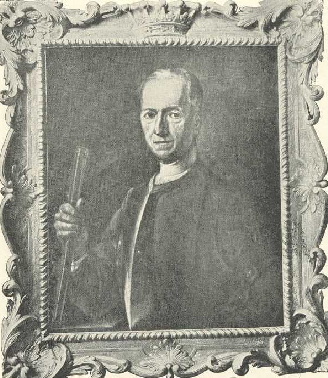| |
|
George Seton, 5th Earl
of Winton |
|

 The
fifth and last Earl, was possessed of excellent abilities, but
from his early years he displayed a marked eccentricity of
character. Some family misunderstandings caused him to leave home
while a mere youth, and he spent several years in France as
bellows-blower and assistant to a blacksmith, without holding any
intercourse with his family. On the death of his father, Viscount
Kingston the next heir, taking for granted that the young Earl
was dead was proceeding to take possession of the title and
estates, when he suddenly appeared and vindicated his rights. It
was afterwards ascertained that a confidential servant kept him
apprised of what was taking place at home and in the family and
had sent him notice of his father’s death. The Seton family,
as we have seen, had always been noted for their loyalty and their
attachment to the old Church, and the last Earl, though he had
renounced the Romish faith, held firmly to the political creed of
his ancestors. He was living peaceably in his own mansion at Seton
when the rebellion of 1715 broke out. It is probable that he
would, under any circumstances, have taken the field in behalf of
the representative of the ancient Scottish sovereigns but his
doing so was hastened, if not caused, by the outrageous treatment
which he received from a body of the Lothian militia, who forcibly
entered and rifled his mansion at Seton. The
fifth and last Earl, was possessed of excellent abilities, but
from his early years he displayed a marked eccentricity of
character. Some family misunderstandings caused him to leave home
while a mere youth, and he spent several years in France as
bellows-blower and assistant to a blacksmith, without holding any
intercourse with his family. On the death of his father, Viscount
Kingston the next heir, taking for granted that the young Earl
was dead was proceeding to take possession of the title and
estates, when he suddenly appeared and vindicated his rights. It
was afterwards ascertained that a confidential servant kept him
apprised of what was taking place at home and in the family and
had sent him notice of his father’s death. The Seton family,
as we have seen, had always been noted for their loyalty and their
attachment to the old Church, and the last Earl, though he had
renounced the Romish faith, held firmly to the political creed of
his ancestors. He was living peaceably in his own mansion at Seton
when the rebellion of 1715 broke out. It is probable that he
would, under any circumstances, have taken the field in behalf of
the representative of the ancient Scottish sovereigns but his
doing so was hastened, if not caused, by the outrageous treatment
which he received from a body of the Lothian militia, who forcibly
entered and rifled his mansion at Seton.
The Earl fought with great gallantry
at the barricades of Preston but was at last obliged to surrender
along with the other insurgents and was carried a prisoner to
London and confined in the Tower. He was brought to trial before
the House of Lords, 15th March, 1716, and defended himself with
considerable ingenuity. The High Steward, Lord Cooper, having
overruled his objections to the indictment with some harshness, ‘I
hope,’ was the Earl’s rejoinder, ‘you will do me justice, and not
make use of "Cowper-law," as we used to say in our country—hang a
man first and then judge him.’ On the refusal of his entreaty to
be heard by counsel, he replied— ‘Since your lordship will not
allow me counsel, I don’t know nothing.’ He was of course found
guilty, and condemned to be beheaded on Tower Hill. ‘When waiting
his fate in the Tower,’ says Sir Walter Scott, ‘he made good use
of his mechanical skill, sawing through with great ingenuity the
bars of the windows of his prison, through which he made his
escape.’ He ended his life in Rome, in 1749, aged seventy,
and with him terminated the main branch of the long and
illustrious line of the Setons. | |
 |
 |
The Earls of
Winton

The Trial of the Earl of
Winton

Seton Family Notes

Masonic Notes

Ernest Thompson Seton

|